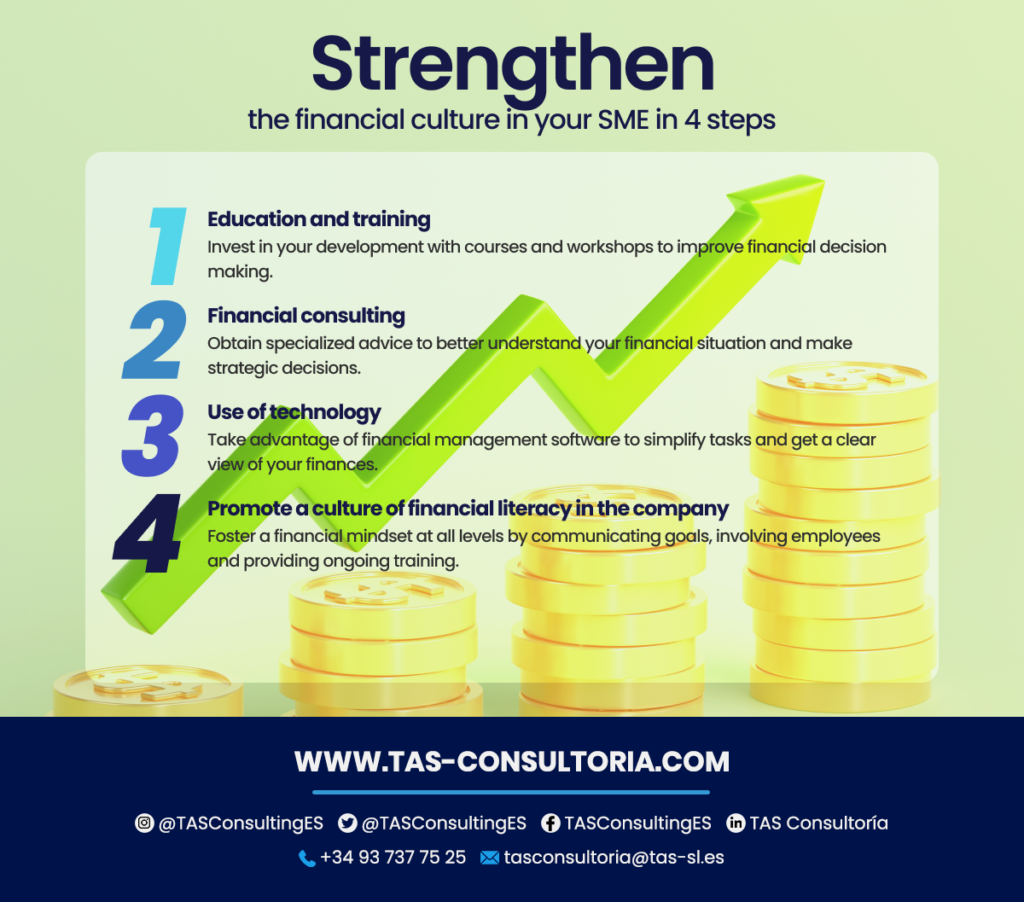
Financial literacy has become a key determinant for the growth and prosperity of Spanish SMEs. In an increasingly competitive business environment, solid financial literacy is essential to make sound decisions and maximize growth potential. Read on to find out how you can strengthen your financial skills and take your business to the next level!
Key findings of the study on financial literacy in small and medium-sized enterprises.
AECA released the report Análisis de la cultura financiera en las pequeñas y medianas empresas (pymes). It examined the level of financial education and culture in 318 owners and managers of SMEs in Spain. Below are the main conclusions drawn from this study:
Evaluation of the level of financial education
The crucial role of financial literacy in the progress and achievement of SMEs is highlighted in this study. It shows that a considerable percentage of SME owners and managers in Spain have a limited level of financial literacy.
This lack of knowledge can lead to poor financial management. As well as difficulties in obtaining financing and making inadequate investment and growth decisions.
The importance of making informed financial decisions
SMEs with a solid financial education are more likely to make sound decisions in the management of economic resources. These companies stand out for their efficiency in planning and expense control. As well as in the evaluation of investment opportunities.
Evaluation of financial risks
The development of a sound financial culture enables small and medium-sized companies to anticipate and mitigate financial risks. This promotes greater business stability and sustainability.
However, it is important to note that SMEs with a higher level of financial literacy may also be more likely to take financial risks.
The role of innovation in business success
SMEs with a foundation in financial education for decision making tend to stand out for their higher level of innovation. This is reflected in their products, services and processes. Also, by their environmentally conscious approach.
The role of family businesses in the business landscape
Non-family businesses have more experience in financial planning compared to family businesses. Likewise, family businesses have a more pronounced tendency towards indebtedness to financial institutions and other businesses.
Many SME owners and managers have limited financial education. This affects their long-term management and success. Below, we share a summary of these points for you to have at hand:

You may also be interested in: Corporate relationships in Spain: which one should I choose?
Additional findings of the study
Importance of financial education training
SME managers indicate having studied a moderate number of financial subjects during their education and express interest in receiving additional training in financial topics.
However, it is not perceived as a need of great importance. A high percentage of them consider themselves to have a high level of financial education.
Financing
SME managers emphasize that indebtedness to financial institutions and other companies is a key factor in their financing decisions, especially in family-owned companies. They also consider capital increases without the entry of new shareholders to be relevant.
Fulfillment of obligations to creditors
There is a concern to comply with payments and they look to financial education for some alternatives to manage it. In general, SMEs show a high concern for meeting payments to creditors within the established deadlines.
Investment evaluation
In terms of investments, SMEs usually carry out a thorough evaluation of projects before making decisions. This reflects a preventive financial education and low tolerance for uncertainty.
Gender disparities
In SMEs, there is a clear gender disparity. That is, 83% of managers are men and only 17% are women. Among those that are managed by women, the following aspects can be highlighted:
- Increased financial literacy in financing decisions.
- Lower propensity to use debt as a source of financing.
- Reduced dependence on bank loans or other companies as external sources of financing.
- More extensive experience in finance or finance-related functions. Also, they have specialized financial education in business decision making, compared to male managers.
Labor perspective
According to recent data, 73% of small and medium-sized companies plan to maintain their level of employment during 2023. Some 20% even expect to increase it.
Regarding the hiring of disabled people, 95.7% of SMEs say they will maintain their employment in 2023. Meanwhile, 4.3% plan to increase their hiring in this group.
Age profile of SME executives
In small and medium-sized companies, the average age of managers is 52 years. They have a solid average of 16 years of experience in management positions. Even so, that experience does not necessarily equate to high levels of financial literacy.
You may also be interested in: EU Stability and Growth Pact
Key tips to strengthen the financial culture in SMEs
Strengthening the financial culture and education of SMEs is fundamental to guarantee their long-term stability and success.
A solid understanding of financial concepts and the implementation of appropriate practices can make the difference between sustainable growth and economic hardship.
We share with you a series of fundamental tips to strengthen the financial culture and education in small and medium-sized companies, to boost your growth!

You may also be interested in: Spain Entrepreneurial Nation Strategy: what does it consist of?
Financial education has become a key element for the growth and success of Spanish SMEs. Strengthen your financial knowledge and adopt sound practices for better decision-making. Boost your business development by subscribing to our content library.
At TAS Consulting, we not only offer you quality content, but also resources, such as guides and infographics, that can help you on the road to success. Don’t wait any longer!




Your email address will not be published .
Required fields are marked with *